
Acute and Critical Care
Scope & Guideline
Transforming acute care with cutting-edge insights.
Introduction
Aims and Scopes
- Critical Care Medicine and Management:
The journal covers various aspects of critical care medicine including innovative management strategies for complex conditions, end-of-life care, and the ethical dilemmas faced in intensive care units. - Pediatric and Adult Intensive Care:
Research spanning both pediatric and adult populations, addressing unique challenges and treatment protocols specific to each demographic. - Use of Technology in Critical Care:
Exploration of advanced technologies such as machine learning, deep learning, and telemedicine in predicting outcomes and enhancing patient monitoring. - Multidisciplinary Approaches:
Focus on the integration of various specialties, including nursing, nutrition, and rehabilitation, to optimize patient care and recovery in critical settings. - Psychosocial Aspects of Critical Care:
Investigation into the psychological and social dimensions of critical illness, including family support, mental health interventions, and post-intensive care syndrome. - Infectious Disease Management:
A significant emphasis on the management of infections, including sepsis, COVID-19, and other infectious challenges faced in critical care environments.
Trending and Emerging
- Telemedicine and Remote Monitoring:
An increasing number of studies focus on the role of telemedicine in critical care, especially in light of the COVID-19 pandemic, showcasing its potential for remote patient monitoring and management. - Psychological and Emotional Well-being:
Research on the psychosocial aspects of critical illness, including the mental health of patients and their families, has gained traction, emphasizing the importance of holistic care. - Artificial Intelligence and Machine Learning:
A significant rise in the use of AI and machine learning algorithms for predicting outcomes in critically ill patients, representing a shift towards data-driven decision-making in critical care. - Nutritional Interventions:
An emerging focus on the role of nutrition in critically ill patients, exploring how nutritional status impacts recovery and outcomes, particularly in the context of COVID-19. - Post-Intensive Care Syndrome Research:
Increased attention towards understanding and managing post-intensive care syndrome, addressing long-term outcomes and rehabilitation strategies for survivors of critical illness.
Declining or Waning
- Traditional Pharmacological Interventions:
There has been a noticeable decline in studies focusing solely on traditional pharmacological treatments, possibly overshadowed by an increasing interest in non-pharmacological therapies and technological advancements. - Single-Center Studies:
The prevalence of single-center studies seems to be waning, with a shift towards multicenter collaborations and larger cohort studies that provide more generalizable results. - Basic Physiological Studies:
Research focusing solely on basic physiological mechanisms without clinical application appears to be less prominent, as the journal emphasizes practical, outcome-oriented studies. - Invasive Monitoring Techniques:
A decline in papers centered around invasive monitoring techniques may indicate a shift towards less invasive methods and a focus on patient comfort and safety. - Emergency Medicine Focus:
The emphasis on emergency medicine topics within critical care seems to be less frequent, possibly reflecting the journal's broader scope towards comprehensive critical care management.
Similar Journals
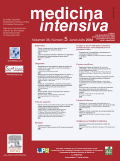
Medicina Intensiva
Transforming Intensive Care Through Innovative FindingsMedicina Intensiva is a distinguished journal published by Elsevier España SLU, specializing in the critical care and intensive medicine fields. Since its inception in 1988, this peer-reviewed journal has established itself as a vital resource for healthcare professionals and researchers dedicated to advancing the knowledge and treatment of critically ill patients. With an impact factor ranked in the Q2 category for Critical Care and Intensive Care Medicine, the journal sits at the 50th percentile among its peers, reflecting its reputable standing in the academic community. The scope of the journal encompasses a wide array of topics, from clinical practices to innovative research findings, contributing significantly to the enhancement of patient care in intensive settings. Although the journal does not currently offer Open Access options, its valuable content is accessible to subscribers and institutions, reinforcing its role as an important conduit for disseminating high-quality research. As we continue into 2024, *Medicina Intensiva* remains committed to supporting the medical community through insightful articles and timely reviews that shape the future of intensive care.
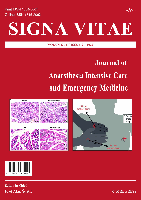
Signa Vitae
Innovating patient care through groundbreaking research.Signa Vitae is a distinguished academic journal published by MRE PRESS, focusing on critical care, intensive care medicine, and emergency medicine. Established in 2008 and running through 2024, this journal serves as an essential conduit for the dissemination of innovative research and clinical practices in these dynamic fields. Based in Croatia, Signa Vitae is indexed in Scopus, highlighting its importance within the scholarly community, boasting respectable quartiles with a Q3 ranking in both Critical Care and Intensive Care Medicine and Emergency Medicine as of 2023. Although it operates under a traditional access model, the journal aims to enhance knowledge sharing and interdisciplinary dialogue among researchers, healthcare professionals, and students globally, addressing the urgent challenges and advancements in patient care. By providing a platform for high-quality studies and reviews, Signa Vitae continues to advance the conversation and practice within critical and emergency medicine.

Medizinische Klinik-Intensivmedizin und Notfallmedizin
Elevating Standards in Critical and Emergency CareMedizinische Klinik-Intensivmedizin und Notfallmedizin, published by SPRINGER HEIDELBERG, is a distinguished journal that serves the fields of critical care, intensive care medicine, emergency medicine, and internal medicine. With an ISSN of 2193-6218 and an E-ISSN of 2193-6226, the journal has established its presence in Germany and has garnered respect within the international medical community. It has demonstrated noteworthy impact, classified in the Q2 and Q3 quartiles across various categories in 2023, including Critical Care and Intensive Care Medicine, Emergency Medicine, and Emergency Nursing. This journal not only showcases cutting-edge research but also offers a platform for sharing innovative practices and clinical developments, thereby facilitating improved patient care and outcomes. As an accessible resource for researchers, professionals, and students dedicated to advancing their knowledge in acute and critical care settings, the journal represents an essential addition to the scholarly landscape in its field.
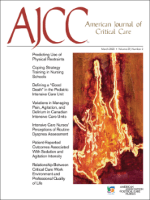
AMERICAN JOURNAL OF CRITICAL CARE
Transforming patient outcomes through dedicated scholarship.Welcome to the American Journal of Critical Care, a premier publication dedicated to advancing the field of critical care nursing and enriching the understanding of critical care practices. Established in 1992 and published by the American Association of Critical Care Nurses, this journal serves as a vital resource for researchers, practitioners, and students alike, providing cutting-edge research, insightful reviews, and evidence-based practices that shape modern critical care. With an impressive impact factor and distinguished rankings—ranking in Q1 for Critical Care Nursing and Q2 for miscellaneous Medicine in 2023—this journal underscores its significance in the healthcare landscape. Although it does not currently offer Open Access, the American Journal of Critical Care remains committed to disseminating high-quality knowledge that drives innovation and improves patient care in critical settings. Join us as we explore the latest advancements and pivotal studies that influence patient outcomes and shape the future of nursing practice.
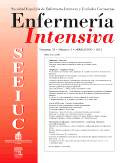
Enfermeria Intensiva
Advancing Critical Care Through Innovative Nursing InsightsEnfermeria Intensiva, published by Elsevier Science Inc, is a highly regarded journal in the fields of Advanced and Specialized Nursing as well as Critical Care and Intensive Care Medicine. With an impressive track record spanning from 1994 to 2024, this journal serves as a vital resource for researchers, healthcare professionals, and students dedicated to enhancing the quality of patient care in critical settings. It holds a coveted Q2 ranking in multiple nursing categories as of 2023, reflecting its influence and contribution to the ongoing discourse in nursing practices. Although currently not an open access journal, it continues to provide intricate insights into both fundamental skills and specialized techniques essential in intensive nursing care. By bridging research and practical application, Enfermeria Intensiva plays a pivotal role in advancing knowledge and improving outcomes in critical care environments.

ANASTHESIOLOGIE & INTENSIVMEDIZIN
Exploring the Frontiers of Pain Management and CareANASTHESIOLOGIE & INTENSIVMEDIZIN is a peer-reviewed journal dedicated to the fields of anesthesiology, critical care, and intensive medicine. Published by AKTIV DRUCK & VERLAG GMBH in Germany, this journal has been an essential resource in the medical community since its inception in 1978. With a current impact factor placing it in the Q3 quartile in both anesthesiology and critical care categories, it serves as a platform for disseminating cutting-edge research and innovative practices. The journal invites contributions that enhance the understanding of pain management, perioperative care, and intensive treatment methodologies. Although not open access, it remains committed to advancing knowledge and improving patient outcomes. With a strong focus on practical applications, ANASTHESIOLOGIE & INTENSIVMEDIZIN is invaluable for researchers, clinical practitioners, and students seeking to deepen their expertise in these crucial areas of healthcare.

Netherlands Journal of Critical Care
Pioneering Insights for Better Patient CareThe Netherlands Journal of Critical Care, an esteemed publication of the NETHERLANDS SOC INTENSIVE CARE, serves as a vital resource for those in the fields of critical care and intensive medicine. As a platform focused on disseminating high-quality research from 2008 to 2023, this journal provides critical insights and advancements pertinent to the rapidly evolving landscape of intensive care practices. Though categorized in the fourth quartile for Critical Care and Intensive Care Medicine in 2023, its commitment to enhancing patient outcomes remains unwavering. With an ISSN of 1569-3511, this journal invites submissions that push the boundaries of knowledge and offer innovative approaches to critical care challenges. Thus, it is an essential reference for researchers, healthcare professionals, and students eager to stay at the forefront of critical care developments in the Netherlands and beyond.

Critical Care and Resuscitation
Pioneering insights in anesthesiology and resuscitation.Critical Care and Resuscitation is a premier peer-reviewed journal published by Elsevier, focusing on the dynamic fields of Anesthesiology, Critical Care, and Emergency Medicine. Established in Australia, this journal has been a significant contributor to scholarly research since its inception in 1999, maintaining a strong reputation with a commendable impact factor, evidenced by its Q1 quartile rankings across its relevant categories for 2023. The journal's commitment to disseminating high-quality research is reflected in its elite standings: it ranks #7 out of 109 in Emergency Medicine, #12 out of 136 in Anesthesiology, and #16 out of 110 in Critical Care. Aimed at researchers, clinicians, and healthcare professionals, Critical Care and Resuscitation provides a vital platform for the latest advancements in patient care and clinical strategies, making it an essential resource for those eager to stay at the forefront of these critical disciplines. Although lacking Open Access options, its rigorous peer-review process ensures the publication of valuable insights that shape current practices and influence future developments in healthcare.
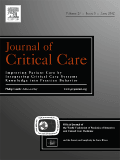
JOURNAL OF CRITICAL CARE
Shaping the Future of Intensive Care Through ScholarshipJOURNAL OF CRITICAL CARE, published by W B SAUNDERS CO-ELSEVIER INC, is a prestigious peer-reviewed journal in the field of critical care and intensive care medicine. With an impressive Q1 classification in 2023, it stands as a leading publication among its peers, ranking #12 out of 110 in the Scopus database, which places it in the 89th percentile of critical care-related journals. Established in 1986 and with a converged timeline extending to 2025, the journal serves as a critical resource for international researchers, healthcare professionals, and students dedicated to advancing practices and understanding within the realm of critical care. Although it does not offer Open Access, the journal provides high-quality, rigorously reviewed articles that address contemporary issues, innovative techniques, and groundbreaking research in critical care medicine. By fostering scholarly dialogue and disseminating new knowledge, the JOURNAL OF CRITICAL CARE is pivotal in shaping the future of intensive patient care and enhancing health outcomes.
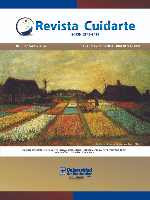
Revista Cuidarte
Connecting Ideas and Practices in Healthcare ExcellenceRevista Cuidarte is a distinguished Open Access journal published by UNIV SANTANDER in Colombia, aimed at advancing the fields of Community and Home Care, Critical Care and Intensive Care Medicine, Family Practice, and Nursing. Since its inception as an Open Access platform in 2010, this journal has become an essential resource for researchers, healthcare professionals, and students, promoting the dissemination of high-quality, peer-reviewed research. With a scope that encompasses diverse nursing disciplines and healthcare practices, Revista Cuidarte plays a pivotal role in enhancing understanding and innovation in patient care. Despite being categorized in the Q4 quartile for some categories and Q2 for Nurse Assisting in 2023, it actively contributes to the academic discourse through its commitment to accessibility and scholarly rigor, thus serving as a valuable outlet for emerging research ideas and practices. The journal is indexed in Scopus, highlighting its regional and international relevance.